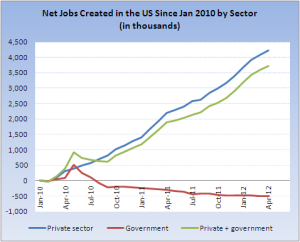Link
‘Rational Inattention’ Guides Overloaded Brains, Helps Economists Understand Market Behavior, by Antonella Tutino, Economic Letter, FRB Dallas: Between Internet news sources, social media and email, people are awash in information, most of it accessible at near-zero cost. Yet, humans possess only a finite capacity to process all of it. The average email user, for example, receives dozens of messages per day. The messages can’t all receive equal attention. How carefully does someone read an email from a sibling or friend before crafting a reply? How closely does a person read an email from the boss?
Limitations on the ability to process information force people to make choices regarding the subjects to which they pay more or less attention. Economists have long acknowledged the existence of human cognitive capacities, but only in recent years have models embodying such limits known as “rational inattention” found their way into mainstream macroeconomics.
Rational inattention models have a broad range of applications. They may reconcile relatively unchanged prices and volatile ones and how the two play out in aggregate demand in the U.S. economy. Moreover, such models can capture salient features of the business cycle, providing a rationale for sharp contractions or slower expansions. Finally, rational inattention models have significant implications for monetary policy. Since the focus of these models revolves around formation of peoples’ expectations, understanding how individuals perceive the economy is instrumental to policymakers’ efforts to achieve output and price stabilization objectives.
Rational Inattention: A Primer
One macroeconomic school of thought—known as rational expectations—assumes that people fully and quickly process all freely available information. By comparison, under rational inattention theory, information is also fully and freely available, but people lack the capability to quickly absorb it all and translate it into decisions. Rational inattention is based on a simple observation: Attention is a scarce resource and, as such, it must be budgeted wisely.[1]
A world with overwhelming amounts of facts and data means prioritizing activities, recognizing individual processing limitations and accepting the consequences when acting, even if all information isn’t fully analyzed. Given a physical constraint on the rate at which people can process information—referred to as Shannon’s channel, after Claude Shannon, a Bell Labs researcher who pioneered information theory in the 1940s—people choose how much attention to devote to different subjects so they can maximize their productivity.
This seemingly abstract concept has a familiar resonance with day-to-day experience. For instance, the maximum amount of information that somebody can download from a computer at any one moment cannot exceed a number—the transmission rate—provided by the manufacturer. Likewise, a person cannot instantaneously respond to a given email. The amount of time it takes to answer email depends on its content and how much information that person wants to process to produce a sensible reply. The brain, which has limits on its processing abilities, is the channel through which an individual directs information, from the original email to the reply.
Incorporating such limits introduces great complexity into economic models. Still, economists are making progress, and results from this new avenue of research can explain several important aspects of macroeconomic performance. For instance, consider the business cycle, the period of activity between booms and busts. Data tell us that in aggregate, output contractions are faster than output growth during a typical cycle. Yet, mainstream models, whose intrinsically symmetric structure tends to make business expansion and contraction roughly equal, cannot account for this characteristic.
Rational inattention theory allows richer modeling that does not assume a symmetry of reactions to positive or negative economic shocks—an unanticipated beneficial boost in technology or an unexpected oil price increase doesn’t produce the same pattern of reactions.
Moreover, rational inattention models carry far-reaching policy implications. The underlying theory aims to provide a solid structure to study economic expectations as well as the public’s reaction to change. If central banks successfully reconcile the two, they can more effectively communicate strategies and goals, thus achieving policy objectives.
Choosing How to Consume
Data show that individuals react more quickly and strongly to loss of wealth than to an enhanced financial condition. The overall economy reduces output in response to a negative shock more rapidly than it boosts production in the presence of positive developments of the same significance.[2]
Rational inattention provides a possible reason for such behavior. Individuals choose bits of information according to their interests; risk aversion may induce people to process negative news faster than positive news. As an example, suppose someone reads in the news that interest rates are falling and businesses are cutting budgets. An interest-rate reduction doesn’t generally prompt people to rush to the bank to obtain a loan so they can consume instantaneously. However, news that companies are cutting expenses, possibly including worker pay, might encourage individuals to more readily seek clarification about their job situation and start making savings plans. Such behavioral differences are an example of an asymmetric response to an economic shock involving consumption and income.
Rational inattention theory produces both micro- and macroeconomic dynamics—individual decision making and broader aggregate behaviors—observationally distinct from standard models.[3] These attributes have motivated new research into developing models that make sufficiently specific predictions that can be compared with actual data for individual and group actions.[4]
Making Labor Choices
The relationship between Shannon channel information processing constraints and the human brain’s capacity suggests how rational inattention may be useful for economic modeling. Consider a person who must decide how much to consume and work while facing uncertainty about wages. Choosing the appropriate amounts and kinds of labor and consumption requires paying attention to current and future savings as well as various ways of earning income from one’s work. Information-processing constraints come into play, limiting the number of combinations the person would realistically evaluate. Applying rational inattention to this situation provides a useful framework for how the task will be undertaken.
For example, the theory’s predictions are consistent with business cycles and secular trends in the U.S.—consumption is more changeable than the number of hours worked.[5] People are more likely to modify how much they save than the amount of time worked, a behavior corroborated by data.[6] Moreover, a group of such behaviors, which may greatly vary among individuals, can be much less volatile when taken together in the aggregate.
Selling Low, Buying High
Why are items on sale always noticeable at the supermarket, while price increases get much less visibility? Rational inattention models suggest that stores have an interest in attracting the attention of the customer to temporary price cuts to increase demand in the hope that the merchants can maintain consumption when the items go back to full price and the discount fades. Models of price-setting are designed to generate price and wage rigidity—the notion that goods prices and salary are fixed for a long time.
Rational inattention not only accomplishes this, but also explains which types of prices are most likely to remain rigid. Moreover, the theory can account for an important feature shared by many grocery store prices: frequent temporary discounting that reverts to a relatively stable price not prone to change outside of the “sale” periods.[7]
Consider the price-setting of a monopolistic producer who pays limited attention to demand. Importantly, the price paths drawn from such models are consistent in ways that rational expectation models are not. For example, under rational inattention, producers’ responses to input shocks, such as a supply disruption, are delayed and gradual; prices are rigid through time, and when changes occur, they are significant. Pricing is asymmetric, with sales (low prices) advertised to pique customer interest while diverting attention from price increases.
Computational complexity prevents the building of a rational inattention model that could explain a marketplace in pricing equilibrium, the point at which sellers can attract buyers to purchase all that they have produced. However, the literature has produced one example in which both consumers and producers have limited capacity to process information about prices.[8]
In that model, sellers produce a range of similar goods and compete perfectly for shares of the market, while consumers decide what bundle of goods to buy and where to shop. An unanticipated technology change affecting producers provides an outside shock. In this model, firms make real profits even if markets are perfectly competitive and prices don’t change for a prolonged period. Mainstream theory predicts that when markets are perfectly competitive, producers can’t charge a high markup without losing customers. Rational inattention models predict that competitive producers, exploiting the limited ability of consumers to process information about pricing, can make larger profits.
Brand-name products are a case in point. They are well advertised and, as a result, people may purchase them instead of often cheaper non-brand-name competitors, though the items may be essentially the same with little difference to justify a premium price.
Making Policy Choices
Whether rigid prices and wages occur because of market structure, such as monopolistic competition, or rational inattention has important policy implications. For instance, regulation may address a monopolistic situation, limiting a firm’s market power. Conversely, if rigidities mainly arise from rational inattention, then efforts should be made to more actively communicate the direction of monetary policy.
Rational inattention also strongly affects policymakers’ communications strategies. Most obviously, the theory suggests that rationally inattentive people make the most of available information by analyzing those bits that are very relevant to their decisions and disregarding the rest. As a result, the public can make better decisions with better overall outcomes if policymakers are highly transparent about what they do and why.
Because rational inattention theory predicts that people pay attention to information according to their needs, people have little incentive to take note of economic bellwethers in times of stability. By contrast, in volatile periods, market participants will allocate more time analyzing current and future macroeconomic indicators. That can result in more changeable behavior, including overreaction to news and policy changes.
Rational inattention implies that monetary policy instruments serve a dual role in the economy—as a stabilizing and signaling device. The theory provides a solid framework to study the effects of the policy changes on private sector behavior by taking into account this double duty.
An implication of this suggests that in troubled economic times, central bankers must pay closer attention to their message. By contrast, in less stressful periods, difficult policy choices can be made with less likelihood of market overreaction.
In email parlance, it’s almost as if an important announcement has been diverted into a spam folder, where it may sit for a long time while attention is given to the daily flow of news and messages. The critical information is there but escapes detection and reaction until much later, if at all.
Notes
1. See “Implications of Rational Inattention,” by Christopher A. Sims, Journal of Monetary Economics, vol. 50, no. 3, 2003, pp. 665–90, and “Rational Inattention: Beyond the Linear-Quadratic Case,” by Christopher A. Sims, American Economic Review, vol. 96, no. 2, 2006, pp. 158–63.
2. See “Some International Evidence on Output-Inflation Tradeoffs,” by Robert E. Lucas Jr., American Economic Review, vol. 63, no. 3, 1973, pp. 326–34.
3. “The Rigidity of Choices: Lifetime Savings Under Information-Processing Constraints,” by Antonella Tutino, Federal Reserve Bank of Dallas, unpublished paper, 2010.
4. “The Empirical Relevance of Rational Inattention,” by Antonella Tutino, Federal Reserve Bank of Dallas, unpublished paper, 2011.
5. See “Intertemporal Substitution in Macroeconomics,” by N. Gregory Mankiw, Julio J. Rotemberg and Lawrence H. Summers, The Quarterly Journal of Economics, vol.100, no.1, 1985, pp. 225–51.
6. See “Rationally Inattentive Macroeconomic Wedges,” by Antonella Tutino, Journal of Economic Dynamics and Control, vol. 35, no. 3, 2011, pp. 344–62.
7. See “Rigid Pricing and Rationally Inattentive Consumer,” by Filip Matejka, CERGE-EI Working Paper Series no. 409, April 2010.
8. “Implications of Rational Inattention on Market Power,” by Fabio Araujo and Antonella Tutino, Federal Reserve Bank of Dallas, unpublished paper, 2010.




